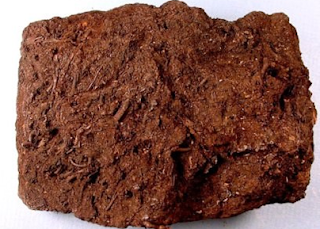August 27, 2019 Fantasy
Non - renewable Energy Resources - Coal:
- Coal is a very old fossil fuel
- The better types of coal have taken several hundred million years to form.
Formation of Coal:
- Coal is formed by the decomposition of natural vegetation, especially equatorial swamp forest.
Types of Coal and their characteristics
Anthracite
- Best quality coal
- Hardest
- Highest hydrocarbon content
- Burns quietly with great heat
- Blackest coal of all
- Formed in very thin layers deep underground
Bituminous
- Darker in color
- Formed deep underground
Bituminous as Steam Coal
- A superior black hard coal found in highly compressed seams
- Burns readily with great heat
- Hydrocarbon content is less than anthracite
Bituminous as Coking Coal
- It is burnt to produce coke – a hard grey porous material
- It is used in blast furnaces for the extraction of iron from iron ore
Lignite
- It is a lower quality coal with a high moisture and ash content
- It has a low heating value
- Present near the surface and it is easier to mine
Peat
- Exclusively vegetative matter
- Represents initial stage of coal formation
- Its carbon content is low
Transportation of coal from the coal mine to the end user
- Extraction of coal from the coalface and crushed
- Loaded onto trolleys which run on a track
- Track leads from the coalmine to the outside surface
- Small coalmines use donkeys as an underground transport
- Once the coal comes out of the mine, the qualities of coal are separated
- Sold to the middleman who further loads it into trucks and supplies it to the brick kilns and cement factories etc where it is used as a fuel
- When the coal is supplied to thermal power stations, rail transport is also used if it is economically feasible
Coal Extraction with respect to Provinces
Province Baluchistan
- Location of Coal: Quetta Coalfields
- Type of Coal: Coking coal locally – Sharig Coal
- Uses: Coking coal is converted into metallurgical coal by mixing with high grade imported coal,Supplied to Pakistan Steel Mills, Sub-bituminous coal is used in brick kilns and for briquetting
Province Sindh
- Location of Coal: Lower Sindh Coalfields
- Type of Coal: Lignite, low quality
- Uses: For heating boilers in the thermal power stations
Province Punjab
- Location of Coal: Salt Range coalfields
- Type of Coal: Sub-bituminous to lignite,Highly volatile, Deteriorates when stored, Poor quality,
- Uses: Used in brick kilns.
Province Khyber Pakhtunkhwa
- Location of Coal: Makerwal coalfields in trans Salt Range, Some sporadic mining is reported from Charat
- Type of Coal: Sub-bituminous, Seams are slightly thicker,Coal is slightly better quality than in the Salt Range coalfield
- Uses: Used in the ceramic industry.
Reasons for Coal as a preferred source of power in near future:
New coal reserves
- Discovery of new coal reserves in recent years
- It is estimated that Pakistan has 7508 million tones of proven coal reserves in eight major fields in Lower Sindh and the Salt Range.
Coal reserves in greater quantity
- According to one study, the coal reserves in the country are many times greater than the total reserves of natural gas and oil.
Saving of foreign exchange
- To save tremendous amount of foreign exchange which is involved in the import of oil
Cheaper
- Cheaper than natural gas so it is used as an alternate source of fuel specially in cement industry
Using latest technology
- The focus of the government's policy is on aggressive coal-mining and modern usage of coal, using the latest technologies, including those developed over the years by the Americans, Europeans and Chinese.
Power generation
- Focus of the coal policy is on power generation through coal and gasification of coal so that it could be used as a cheap fuel.
As a fuel for industries
- Through gasification the fuel companies convert coal into easily transportable coal gas or liquid fuels
- The coal is heated in the presence of steam and oxygen to produce coal gas which is a mixture of carbon monoxide, hydrogen and methane.
- It is directly used as a fuel or refined into cleaner-burning gas to make it environment friendly.
- Coal based vapor fuels are produced through this process
Government’s will
- Government needs to improve and modernize coal mining operations to increase the use of coal in industries
Process of using coal in Iron and Steel Industry:
- Heating coal
- Converting it into coke - a hard substance consisting of nearly pure carbon
- Combining coke with iron ore and limestone
- The mixture is heated to extract the iron from the iron ore
- Other industries use the different coal gases emitted during the coke-forming in order to make fertilizers, solvents, pharmaceuticals, pesticides, and other products.
Power generation using Coal
Arguments against (Environmental Loss)
- Not advisable to build coal fired power plants close to River Indus
- Coal fired power plants are largest source of fly ash and mercury pollution falls into nearby rivers where it builds up in fish
- Upon consumption of mercury polluted fish people suffer from brain damage and nervous system disorders, particularly in young children
- Fly ash could cause lowered crop yield, respiratory disorders, contamination of groundwater with toxic salts and metallic contents
Arguments in favor (Economic Gains)
- To overcome energy crisis Pakistan has to rely on coal
- Huge reserves of Thar Coal field could be utilized
- Coal could be exported to India
- Cheap electricity could be produced
- Foreign exchange could be saved by not importing expensive oil











0 comments:
Post a Comment